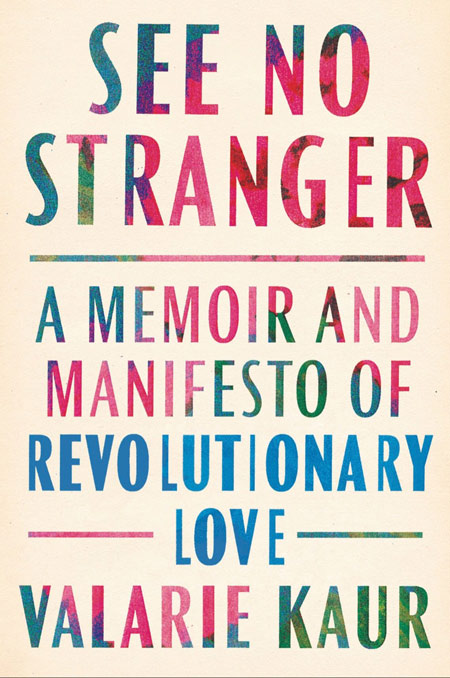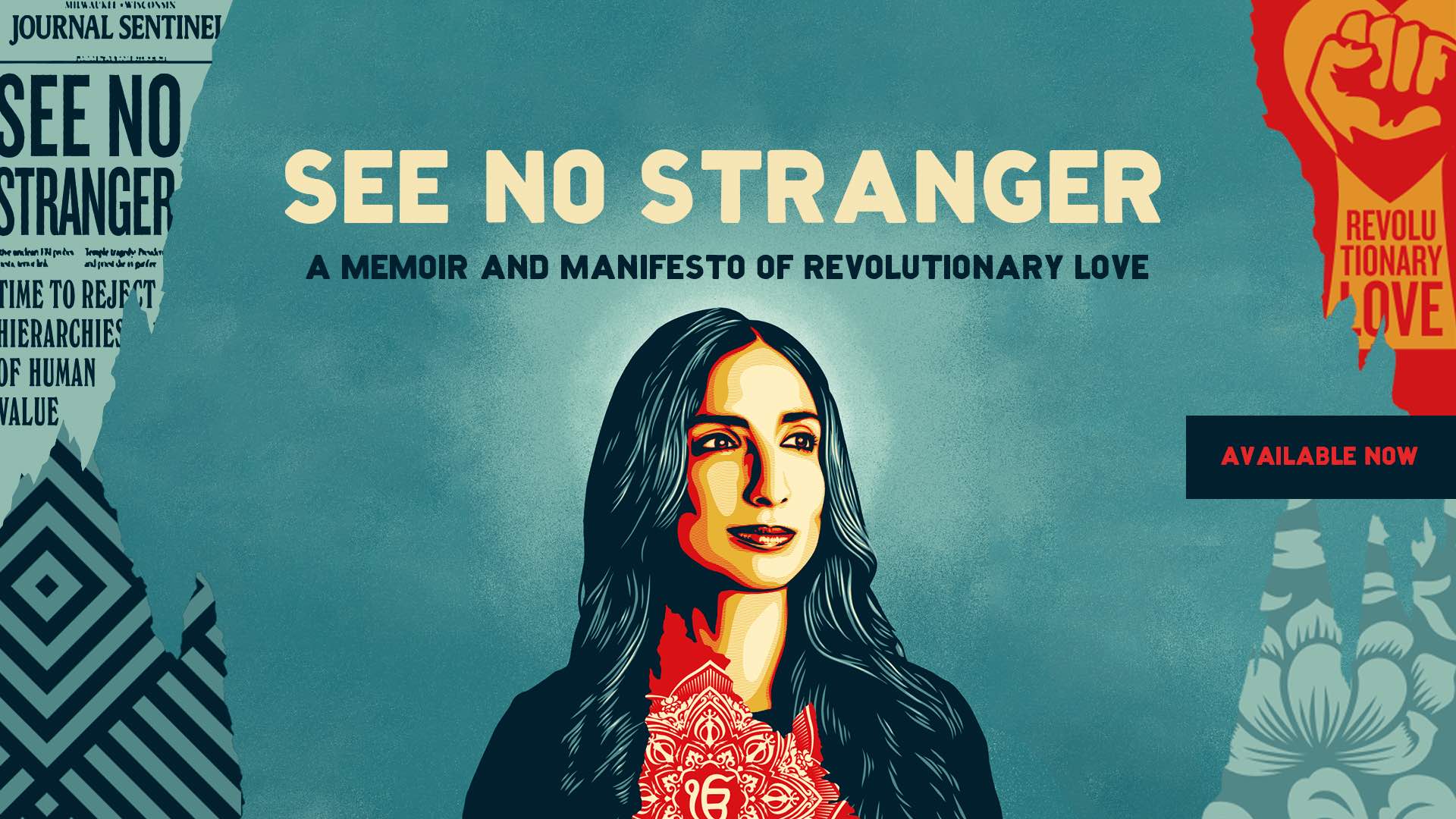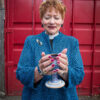You’re invited!
You are invited to gather to discuss Valerie Kaur’s extraordinary work See No Stranger: A Memoir and Manifesto of Revolutionary Love.
Meetings will take place over the course of 6 Wednesdays, from March 2nd to April 6th @ 7:00 to 8:15pm on Zoom. Please let us know if you plan to join us by registering HERE!
If you need financial assistance to purchase the book, please contact our pastor, Rev. Wendy at wendy@sanctuaryucc.org
It is highly recommended that you read the book, but you can participate if you have not – but watching/reading resources noted below and in the lesson plan.
About the Book
An urgent manifesto and a dramatic memoir of awakening, this is the story of revolutionary love.
How do we love in a time of rage? How do we fix a broken world while not breaking ourselves? Valarie Kaur—renowned Sikh activist, filmmaker, and civil rights lawyer—describes revolutionary love as the call of our time, a radical, joyful practice that extends in three directions: to others, to our opponents, and to ourselves. It enjoins us to see no stranger but instead look at others and say: You are part of me I do not yet know. Starting from that place of wonder, the world begins to change: It is a practice that can transform a relationship, a community, a culture, even a nation.

Kaur takes readers through her own riveting journey—as a brown girl growing up in California farmland finding her place in the world; as a young adult galvanized by the murders of Sikhs after 9/11; as a law student fighting injustices in American prisons and on Guantánamo Bay; as an activist working with communities recovering from xenophobic attacks; and as a woman trying to heal from her own experiences with police violence and sexual assault. Drawing from the wisdom of sages, scientists, and activists, Kaur reclaims love as an active, public, and revolutionary force that creates new possibilities for ourselves, our communities, and our world. See No Stranger helps us imagine new ways of being with each other—and with ourselves—so that together we can begin to build the world we want to see.
Session Schedule and Resources
SESSION 1 – WED, MAR 2
Table of contents and introduction
ADDITIONAL RESOURCES
- Read this web page and watch Valarie Kaur’s TedTalk (22-min): 3 Lessons of Revolutionary Love in a Time of Rage
SESSION 2 – WED, MAR 9
Read pages 1-98 (Part I)
Additional Resources
Chapter 1 – Wonder
- Watch Chimamanda Ngozi Adichie TedTalk, (18-min): Wonder and storytelling: “The danger of a single story”
Chapter 2 – Grieve
- Read Ibram Kendi’s article “The American Nightmare (The Atlantic, Kendi, 2020) or via PDF Here
- Watch Documentary film: “Divided We Fall: Americans in the Aftermath” (Kaur and Raju, 2008)
Chapter 3 – Fight
- Watch TedTalk/Interview with Ibram Kendi: The Difference Between Being Not Racist and AntiRacist (Ibram Kendi, 2020)
Session 3 – Wed, Mar 16
Read pages 99-205 (Part II)
Additional Resources
Chapter 4 – Rage
- Read bell hooks’ essay: “Killing Race: Militant Resistance” (bell hooks, 1996)
Chapter 5 – Listen
- Watch this short documentary (20-min): Confederate Pride, White Supremacy, and My State Flag (Moral Courage, 2017)
Chapter 6 – Reimagine
- Watch 15 min TedTalk: What a world without prisons could look like (Van Buren, 2017);
- Listen to 80-min (two-parts) podcast: Ruth Wilson Gilmore Makes the Case for Abolition (Intercepted Podcast, June 10, 2020)
Session 4 – Wed Mar 23
Read pages 206-300 (Part III)
Additional Resources
Chapter 7 – Breathe
- Watch My Body Doesn’t Oppress Me, Society Does (Patty Berne and Stacey Milbern, 2017)
- Breathing and lessons from disability justice movements: Read: 10 principles of disability justice (Sins Invalid, 2019);
- Listen: Organizing in a Pandemic: Disability Justice Wisdom (Podcast)
Chapter 8 – Push
- Pushing, healing, and revolutionary love
- Watch Ted Talk: Me Too is a Movement, Not a Moment (Burke, 2018); Transcript
- Me Too Website
- Watch Ted Talk: The urgency of intersectionality (Kimberlé Crenshaw, 2016)
- For Further Exploration on Accountability/Apology Accountability
- Listen to Brenè Brown’s podcast/research on the necessity of accountability for harm, the relationship between accountability, shame, and guilt, and why shaming others is not an effective tool for social justice.
- How To Give A Good Apology by Mia Mingus
- Part 1: The Four Parts of Accountability (Mia Mingus, 2019)
- Part 2: The Apology—The What and The How (Mia Mingus, 2019)
*Important note: Mingus writes that these pieces specifically refer to “apologizing to people that we care about; people with whom we want to continue to be in relationship; people who are already in our lives and with whom we have loving or caring relationships.”
- On apologizing after committing harm, Watch Ted Talk: The profound power of an authentic apology (V, formerly Eve Ensler, 2019) (transcript available
Chapter 9 – Transition
- Transitioning ourselves, our communities, and our nations:
- Read These Are The Times That Grow Our Souls (Boggs, 2003)
- Watch Valarie Kaur’s Watch Night Service 2017
- Watch What will you tell your daughters about 2016? poet, playwright, and educator Chinaka Hodge.
- Watch Remembering Grace Lee Boggs, “We Have to Change Ourselves in Order to Change The World”
- Watch Documentary “American Revolutionary: The Evolution of Grace Lee Boggs” (film 2013)
Session 5 – Wed, Mar 30
Read pages 301-332 (Epilogue)
Additional Resources
Chapter 10 – Joy
- Joy and revolutionary love.
- Read the Poem “On Joy and Sorrow” (Gibran, 1923)
- Read “Racism is Terrible, Blackness is Not” The Atlantic (Perry, 2020)
Session 6 – Wed, Apr 6
Review the Revolutionary Love Compass (Overview | Detailed Guide)
Additional Resources from The Revolutionary Love Project
- The See No Stranger: Revolutionary Love Compass (10 Core Practices)
Overview
Detailed Guide - The See No Stranger: Revolutionary Love Reader’s Guide
- At a Glance: Overview of Lessons and Links for Videos/Additional Resources (from Educator’s Guide)
- For discussion questions that will inspire your reading: Reader’s Guide





